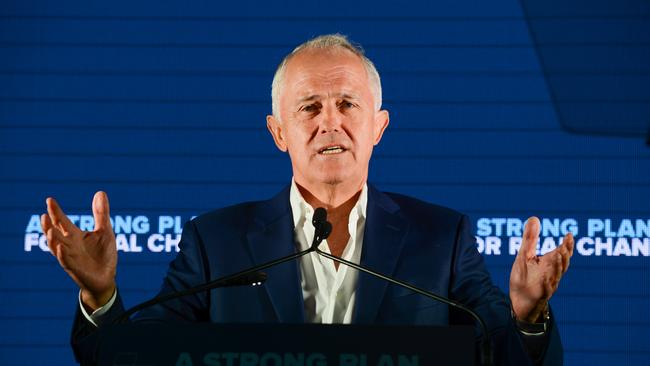Newspoll: PM surges as pressure increases on Shorten
Malcolm Turnbull has cemented his command over Bill Shorten as the nation’s preferred PM, finds the first Newspoll of 2018.

Malcolm Turnbull has cemented his command over Bill Shorten as the nation’s preferred prime minister as the two leaders brace for a showdown over economic policy, with the government beginning to close the gap on the opposition amid signs disaffected voters are drifting back to the Coalition from One Nation.
While Liberal leadership tensions are likely to be put to rest, with Coalition voters overwhelmingly backing Mr Turnbull as leader, Bill Shorten’s pursuit of a radical left-wing economic agenda is set to be tested.
With the first Newspoll of 2018 showing the Coalition lifting its primary vote two points in the past two months, pressure is likely to intensify on the Opposition Leader, with Newspoll also revealing that almost half of all voters prefer either Anthony Albanese or Tanya Plibersek to Mr Shorten as federal Labor leader.
The Newspoll, conducted exclusively for The Australian, shows the Coalition edging back into contention and returning to a two-party-preferred vote it hasn’t enjoyed since April last year, providing a much-needed boost for the Prime Minister.
While still trailing 48-52 on a two-party-preferred basis, having barely managed to lift its vote above 47-53 since the start of last year, the one-point improvement since December puts the government within striking range of Labor.
Mr Turnbull has benefited from a sharp improvement in how voters assess his performance, with his satisfaction rating lifting five points to 37 per cent. This is the biggest increase in his performance rating since the early days of his leadership but still well below its peak.
While approval of Mr Shorten also rose, by two points to 34 per cent, more people were dissatisfied with his performance than with that of Mr Turnbull, who has extended his lead as preferred prime minister by four points to 45 per cent over the Labor leader, who dropped back three points to 31 per cent. This is the best margin Mr Turnbull has held over his rival since August when he enjoyed a similar spike in his personal ratings.
The poll comes ahead of today’s return of parliament with the government seeking to increase pressure on Mr Shorten to act against several MPs facing dual-citizenship questions and the opposition likely to return fire over the lost cabinet papers scandal.
The Coalition’s primary vote improvement to 38 per cent — now a point ahead of Labor’s, which remains unchanged — has come at the expense of One Nation, which has witnessed a halving of support since last November, dropping to 5 per cent in the latest poll.
The Coalition’s primary vote is still historically low and still four points behind its election result, which delivered it government with a one-seat majority.
While voters are historically more favourably disposed to the government after the two-month summer break, the slow drift of the Liberal base back to the Coalition since November suggests discontent with Mr Turnbull among conservative voters may not yet be locked in.
One Nation, dogged by a poor result in Queensland and questions over its internal stability, continued a slide that began in early November following the Queensland state election.
Reaching a high-water mark of 10 per cent, before receding to 7 per cent in December, it has now recorded its worst result since the last election, sitting at just 5 per cent.
The bulk of this vote has swung directly back to the Coalition, which has lifted its primary vote from a low of 34 per cent in November back to 38 per cent, with one point going to other conservative independents.
Mr Turnbull has enjoyed a striking turnaround in the leadership stakes after coming under pressure late last year during the citizenship crisis when a Newspoll recorded most voters preferring Foreign Minister Julie Bishop over Mr Turnbull as leader.
Mr Turnbull is now comfortably ahead of those regarded as the most likely challengers, including Ms Bishop, Peter Dutton and Tony Abbott.
The poll reflects a fortnight in which both leaders laid down markers for the battle ahead, signalling wildly different economic philosophies on how to alleviate pressure on household budgets. Mr Shorten, who has come under scrutiny over an internal factional brawl in his home state of Victoria, has identified health costs, wage growth and inequality in a hard-line interventionist cost-of-living agenda aimed at raising taxes for the well off to redistribute to low-income earners and those dependent on welfare.
Mr Turnbull, by contrast, has continued to argue for company tax cuts as the path to generating jobs and lifting wages through stronger economic growth.
Yesterday he vowed to aggressively pursue his company tax and personal income tax agenda.
The Australian understands that the government will seek to push through the remaining company tax cuts — to reduce the rate from 30 per cent to 25 per cent for all companies — by the end of this week.
“Bill Shorten has got the most anti-business, the most anti-investment, the most anti-jobs policy of any Labor leader since Whitlam,” Mr Turnbull said yesterday.
“You cannot get out of the reality which Paul Keating recognised when he reduced company tax, when Bill Shorten recognised when he made the case for it — quite eloquently, in fact, when he was in government — if you encourage business to invest, they will do so, and you will then get more investment, more jobs.”
Mr Shorten yesterday unveiled a plan to cap private health insurance premiums which was immediately attacked as potentially crippling the private health sector.
The poll of 1616 voters across all states, inclusive of regions and cities, was conducted between February 1 and February 4 and has a margin of error of 2.4 per cent.







